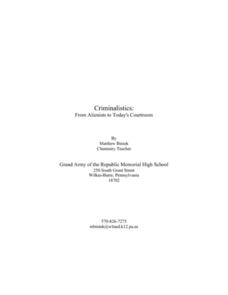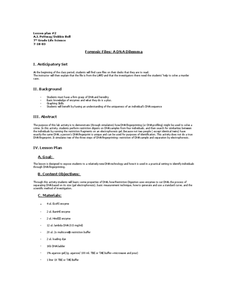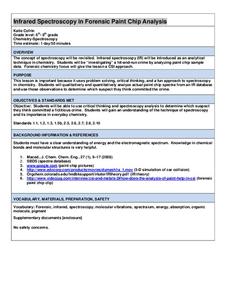Curated OER
The Visible Spectroscopy Expert Witness Problem
In a simulated crime science investigation, chemistry or physics sleuths use spectroscopy to analyze solutions. The lesson gives learners practice making salicylate solutions, using spectrophotometers, calculating dilution amounts,...
Curated OER
Who Took Jerell's iPod? ~ An Organic Compound Mystery
Within the setting of a crime scene investigation, biochemistry beginners analyze organic compounds as a means of determining "Who dunnit." They use a brown paper test for lipids, glucose test strips and iodine to identify carbohydrates,...
Curated OER
Confectionary Bureau of Investigations: Case of the Cookie Mystery
Students perform tests on different chemicals to determine their chemical properties. In this forensic science lesson, students identify an unknown sample using its physical and chemical properties. They solve a fictional crime using...
Curated OER
Blood Typing Investigation
Young scholars role-play a scenario in which a car crash patient is inadvertently given the wrong blood type during a transfusion. They perform blood typing and explore the genetics behind ABO and RH blood types using simulated blood.
Curated OER
DNA Detectives
In order to understand DNA fingerprinting, advanced biology aces divise a crime scenario and analyze three different samples of lambda DNA. This creative lesson plan provides practice with micropipettes, electrophoresis boxes, and other...
Curated OER
Forensic Detectives: Archaeology at Work
Dig in! Middle schoolers learn about archaeology by exploring the remnants of the Chiribaya bodies found in Illinois. Compare archaeological investigations, and then write a mystery detailing the discovery of a body! Consider bringing in...
Kenan Fellows
Unit 2: DNA Analysis
Ever wonder how they solve those mysterious murders in TV crime dramas? The second of four units in a Biotechnology series introduces scholars to the many methods of DNA analysis. Pupils create and run their own gel electrophoresis...
Curated OER
Science: Criminalistics - A New Look at Crime
Students examine the world of forensic science, focusing on fingerprint analysis. In the lesson, they implement a method by which fingerprints of class members are categorized and identified. Elementary students study classification...
Curated OER
My Science Box: DNA Fingerprinting
Young scholars identify DNA in a crime scenario. In this DNA lesson, students perform paper chromatography and compare it against the pens of various suspects.
Curated OER
Murder Mystery
High schoolers examine how to capture foot prints while they simulate a criminal investigation. They discover how the clues are needed for identifying or eliminating murder suspects.
Curated OER
Flesh Eating Bugs, Moldy Corpses, The Trail of a Killer
Learners read about how forensic entomologists use maggots to solve murders. In this forensic science lesson, students read an article and answer questions. They go to different websites about evidence and fingerprinting.
Curated OER
Who Did It?
Students explore how forensic science is used in criminal investigations. They learn that for the next few days that are going to try to solve a crime that took place in the classroom. Students are given a story to read about the crime...
K20 LEARN
More than Skin Deep
From crime to paternity, DNA fingerprinting has revolutionized how the world views inherited traits. Science sleuths investigate the facts about DNA profiling through a variety of activities. The Teacher's Guide includes printable...
Curated OER
Crime Scene Investigation (CSI) with Powdery Mildew Fungi
Young scholars explore a specific method of identifying fungi, using a written key and an illustrated key. Powdery mildew fungi can be identified to genus by the morphology (appearance) of the sexual stage (cleistothecia).
Curated OER
Who Done It?
Pick and choose which activities to include in this crime scene investigation. Junior detectives can examine fingerprints, DNA, blood samples, or bone structure. The plan suggests you have teams solve a mystery, but it does not give you...
Curated OER
Forensic Files: A DNA Dilemma
Seventh-graders come in to science class to find a file on their desks detailing a crime to be solved! As a demonstration, you simulate the restriction of DNA samples and separate them by electrophoresis. From the gel, learners can...
Curated OER
Introducing Chromatography
Middle schoolers investigate chromatography. In this chromatography lesson plan, students investigate a lab set up for chromatography.
Curated OER
Science and the Scientific Process
Young scholars investigate the characteristics of different soil samples. In this physical science lesson, students play the role of forensics solving a crime by matching soil from the suspect's shoes. They formulate a conclusion after...
Curated OER
CSI Podcasts
Learners investigate crime scene scenarios to meet standards. In this crime scene scenario instructional activity, students gather background information during the first week. They investigate topics such as mammals, genetics, bacteria,...
Curated OER
Interdisciplinary Applications of Chemistry Through Engineering in Modern Medicine
Students explore the different techniques used in forensic science. In this chemistry activity, students investigate a fictional crime and identify the culprit. They create a brochure or collage career bulletin.
Curated OER
DNA Fingerprinting
Students discuss DNA Fingerprinting and gel electrophoresis before participating in a crime solving activity. Students simulate their DNA using adding tape and complete the steps necessary to do a gel electrophoresis. They discuss the...
Curated OER
Who Ate The Cheese?!
In this crime scene investigation worksheet, students simulate DNA sequencing and DNA restriction analysis using paper strips of DNA. Students compare the crime scene DNA to the suspects and determine who is guilty.
Curated OER
Infrared Spectroscopy in Forensic Chip Analysis
Students analyze spectrums as related to forensics. In this chemistry lesson, students define spectroscopy and discuss its use in chemistry. They discuss how the Forensic Paint Chip is used to help solve crimes.
Curated OER
Hair
In this forensic science worksheet, learners identify the different parts of the hair. They complete 18 short answer questions on how hair evidence is used in forensics.

























